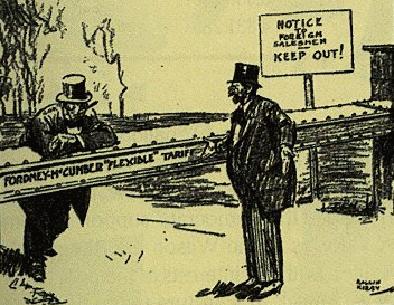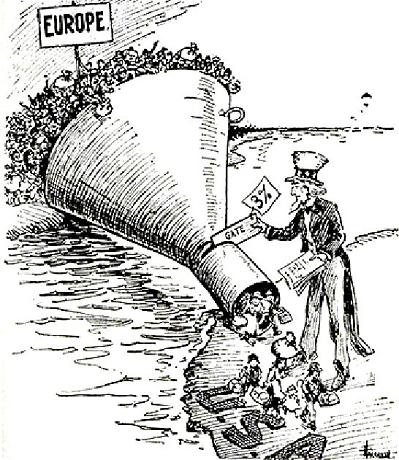The whole aim of
practical politics is to keep the public alarmed (and hence
clamorous to be led to safety) by menacing it with an endless
series of hobgoblins, all of them imaginary.
HL Mencken (1923)
Tariff, noun,
1. a list or table of
duties or customs payable on the importation or export of goods.
2. a duty on any
particular kind of goods.
Hutchinson Educational
Encyclopedia Dictionary (2000)
* * * * *
The new government of Warren Harding brought in
two developments which are often attributed to 'isolationism'
(although they had other causes).
The first was to
increase tariffs on foreign imports to protect American
industry.
The second was to restrict
immigration.
|
Links
Senator Clancy
attacks quotas, 1924
'Shut the door!
- Senator Smith argues for restriction, 1924
Immigrant quotas under the 1924 Act
Account of the Sacco-Vanzetti case
YouTube
on the Red Scare
Podcast:
 - Giles Hill on
American isolationism - Giles Hill on
American isolationism
Powerpoint:
• Isolationism
ppt.
|
|
Wilson believed in low tariffs. He
had reduced tariffs in 1913, and refused to increase them.
Demand was growing, however, for higher tariffs
(Source B). As soon as he
became President, Warren Harding passed an Emergency Tariff (May
1921) to increase duties on food
imports, and in 1922
Congress passed the Fordney-McCumber
Tariff. This had two
principles:
a. 'Scientific
tariff': this linked tariffs to the
wages in the country of export. If wages in, say
Italy, were very low, then Italian goods were given a
proportionately higher tariff. This negated the
effect of lower wages in competitor countries.
b. 'American
Selling Price': this linked tariffs to
the price of American goods, not to the cost of production.
A German company might be able to produce, say, a certain
chemical for $60, but if the selling price in America was $80,
and the US tariff was 50%, the tariff would be $40.
This meant that foreign imports were ALWAYS more expensive than
American-produced goods, however cheaply they had been made.
The Fordney-McCumber Act established the highest
tariffs in history, with some duties up to 400% and an average
of 40%.

An anti-tariff American
cartoon of the time, linking the tariff to isolationism.
The French man is saying: 'But Monsieur, where does it end'.
In the long-run, the Fordney-McCumber Act damaged
the American economy, because other countries retaliated by
putting up their duties and stopping American exports.
However, for the moment, America was a huge new country, and
there was plenty of demand at home.
|
Source A
If ever there was
a time when Americans had anything to fear from foreign
competition, that time has passed. If we wish to have Europe
settle her debts, governmental or commercial, we must be
prepared to buy from her.
Woodrow Wilson, speaking
in March 1921
Wilson
had just vetoed the Emergency Tariff Bill, just before he
handed over the Presidency to Harding.
Source B
Why Americans wanted high tariffs
[WAIF]
Tariffs stop imports!
a.
Wartime
boom:
American business had boomed
during the war - possibly because the countries involved in the
war hadn't been able to sell goods to America - and American
businessmen wanted this to continue.
c.
American
wages:
American wages were
rising, and American businessmen feared that low wages in Europe
would allow European firms to undercut them.
Thus Joseph Fordney claimed that tariffs would protect American
workers' jobs.
b.
Isolationism:
American isolationists wanted America to be
self-sufficient
.
d.
Farm
Bloc:
Overproduction was causing
a depression in farming. Farmers hoped that
protection would help keep prices up.
Extra:
Is the
Fordney-McCumber Act an example of 'isolationism'?
|
|
ALL Americans were immigrant families, of course,
but until 1890 most immigrants were 'WASPs' (white Anglo-Saxon
Protestants) from the wealthier countries of Europe such as
Britain, Germany and Sweden. After 1890, more
immigrants started arriving from Eastern Europe and Asia.
Demand was growing, however, to slow down
immigration (Source F), and there followed a number of laws to
restrict immigration:
a. 1917: Immigration Law
This
required all immigrants to prove they could read English, banned
all immigration from Asia, and
charged an immigration fee of $8.
b. 1921: Emergency Quota Act
This
stated that the number of immigrants from 'the
eastern hemisphere' could not be more than 3% of the number
already in America in 1910. It
set the maximum number of immigrants in any year
at 357,000.
c.
1924: Reed-Johnson Act
Maximum number of immigrants in any year at
154,000.
Quota from
eastern hemisphere reduced to 2% of those already in
America in 1890; the South and the East of
Europe were thus only allowed to send 20,000 immigrants per
year, and non-Europeans only 4,000.

An American cartoon of 1921
At the same time measures were taken to
'Americanize' immigrants:
● The Federal Bureau of
Naturalization
organised naturalization proceedings,
and patriotic 'Americanization Day' rallies and Fourth of July celebrations.
●
The Federal Bureau of Education
organised
courses on politics and democracy
to prepare immigrants for the 'citizenship exam'.
The
courts clamped down harshly on political crimes
by immigrants
(The case you MUST know
about is the trial of Sacco and Vanzetti - two immigrants from
Italy who were anarchists - who
in 1920 were found
guilty of armed robbery and
murder (and executed in 1927), even though
the defence produced 107 witnesses that they were elsewhere at
the time, and in 1925 the actual murderer came forward and gave
himself up ... the jury did not believe the defence witnesses
because they were all Italian immigrants).
Not all this was racism and prejudice - many
social workers saw it a a way to help immigrants out of the
terrible poverty many of them lived in.
|
Source C
America is God's Melting Pot,
where all the races of Europe are melting and reforming!
Germans, Frenchmen, Irishmen and Englishmen, Jews and
Russians - into the
Melting Pot with you all! God is making the
American.
Israel Zangwill, The
Melting Pot (1908)
Source D
New arrivals should be limited to
our capacity to absorb them into the ranks of good citizenship.
America must be kept American ...
I am convinced that our present
economic and social conditions warrant a limitation of those to
be admitted. Those who do not want to be partakers of the
American spirit ought not to settle in America.
President Coolidge, Message
to Congress, 1923
Source E
As soon as they step off the decks
of their ships our problem has begun - bolshevism, red anarchy,
black-handers and kidnappers, challenging the authority and
integrity of our flag…
Thousands come here who never take
the oath to support our constitution and to become citizens of
the United Sates. They pay allegiance to some other
country while they live upon the substance of our own.
They fill places that belong to the loyal wage-earning citizens
of America… They are of no service whatever to our people.
They constitute a menace and a danger to us every day..
Speech by
Senator Heflin of Alabhama, 1921
Source F
Why stop immigration [PRT]
Racism and mistrust!
a.
Prejudice:
after 1880, many immigrants were poor
Catholics and Jews
from eastern Europe.
This worried the WASPs; one Senator in the 1920s said that the
American pioneers were turning into 'a race of mongrels'.
b.
Red
scare:
Communism terrified Americans; a number of bombs
were planted in 1919-21, one by an immigrant Italian.
Immigrants were suspected of being communists and anarchists.
c.
Trade
Unions:
opposed immigration because they feared that
immigrants would work for lower wages and take their jobs.
Extra:
1.
Prejudice/
Red
Scare/
Trade
Unions
- can you see any of these prejudices influencing the
statements in Sources D and E?
2.
Why do you think the 1924 Act pushed the Census year back
from 1910 to 1890
|